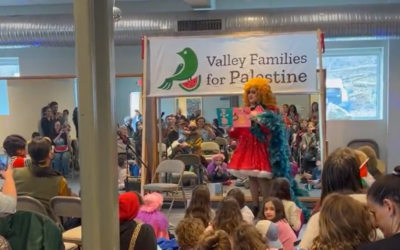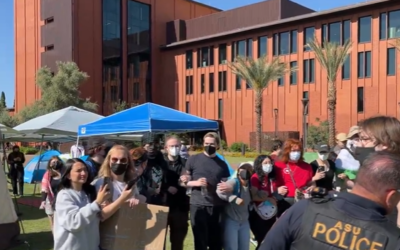By Daniel Stefanski |
A conservative grassroots group is warning the Arizona legislature about the westward expansion of a provider of digital mental health solutions.
On Tuesday, the Arizona Women of Action shared information about Kooth’s pending partnership with the State of California and its interest in working with the Arizona Legislature, tweeting, “the data mining of children & increase in mental health services with a decrease in parental involvement is of grave concern.”
On its website, Kooth describes its company as “pioneering innovators of digital behavioral health care, giving a range clinically proven, research evidenced therapies for dealing with stress, anxiety, depression, or what every (people) may be going through.” Kooth asserts that its services cover “over 15 million people internationally.”
In March, the California Department of Health Care Services (DHCS) revealed that “it will launch the Behavioral Health Virtual Services Platform, a new technology-enabled services solution for all children, youth, and families in California, in January 2024. The platform is part of Governor Newsom’s Master Plan for Kids’ Mental Health and the Children and Youth Behavioral Health Initiative (CYBHI), a $4.7 billion investment in youth behavioral health.”
Governor Newsom rolled out this plan in August 2022 “to ensure all California kids, parents and communities have increased access to mental health and substance use services.” At the time, Newsom stated, “Mental and behavioral health is one of the greatest challenges of our time. As other states take away resources to support kids’ mental health, California is doubling down with the most significant overhaul of our mental health systems in state history.”
The announcement from DHCS added that it had “selected Kooth to support the delivery of equitable, appropriate, and timely behavioral health services to youth and young adults (ages 13-25).” DHCS noted, “Kooth will also integrate with other partners to provide a seamless user experience, including providing services and supports to children (ages 0-12) and their parents/caregivers.”
Kooth’s CEO, Tim Barker, said, “We’re excited to partner with DHCS and the State of California to help transform access to digital behavioral health support for youth across the state. Working together, we believe this represents a step-change in providing early and responsive access to behavioral health care to help address the growing youth mental health crisis.”
California’s selection of Kooth follows the launch of a pilot program in late 2022 in Pennsylvania, which had bipartisan support from state lawmakers. In a news article on November 2, State Senator Lisa Baker said, “This pilot project has the potential to fill some crucial gaps. I am pleased to see that several school districts in northeastern Pennsylvania will be participating. Our constituents will be encouraged to see constructive action on problem-solving that has bipartisan support.”
The piece in the Times Leader added context from Senator Baker, including that “the web-based counseling program by Kooth US was awarded a grant through the Department of Human services that enables school districts to opt into the services without cost to students, parents or the district;” and that “the grant was funded in the FY 2022-23 state budget in acknowledgement of the mental health crisis currently being faced by young people.”
Earlier this year, the Pennsylvania Capital Star reported that a bipartisan coalition of legislators would be traveling to Arizona to “highlight their work with the Pennsylvania Health Department’s contract with Kooth US.” Kevin Winters, the General Manager for Kooth US stated, “The model that we are using now in Pennsylvania has the potential to break down the barrier of access to mental health, and we’re grateful for the advocacy of these legislators in funding this program for students. We’re anxious to expand the model to other states, and honored to present it to such an important audience in Arizona.”
One of the Pennsylvania legislators who came to Arizona in February, Representative Ryan Bizzarro, shared pictures of the event on his Instagram, writing, “Increasing access to mental health services for Pennsylvania students isn’t a partisan issue. In fact, Pennsylvania is the only state that was able to put partisan politics aside and work on modernizing mental health services by creating a space for digital mental health care – all while increasing access for everyone. And now, we’re helping the Arizona state legislature do the same! I’m happy to be part of this bipartisan / bicameral group of Pennsylvania legislators working to change the future of mental health care not only in our commonwealth, but across the U.S.”

While Arizona welcomed this delegation from Pennsylvania, the state legislature was also considering a bill to address the state’s mental health issues among teenagers. Republican Representative Travis Grantham sponsored HB 2635, which would have “authorized a school district governing board to develop or purchase a digital application to assist with threat assessments.” In February, the proposal passed both the House Education and Rules Committee without a single vote in opposition, yet it was held from final passage in the chamber because, in part, of concerns from grassroots groups like Arizona Women of Action.
The critique of Grantham’s bill caused him to introduce a floor amendment to his original proposal, changing the focus of the digital application to assistance with “suicide prevention and substance misuse.” The amendment also removed “the requirement that the digital application allow students to report safety issues and receive anonymous clinical support,” and it required “the digital application to provide suicide prevention and substance misuse resources to parents and, subject to parental consent, students.”
Representative Grantham explained that his amendment “put guard rails on the current bill,” and told AZ Free News that “many of his colleagues were concerned that the legislation was too broad and could invite mental health counseling that became even more damaging than the problem itself.” That bill remains on hold.
Daniel Stefanski is a reporter for AZ Free News. You can send him news tips using this link.








